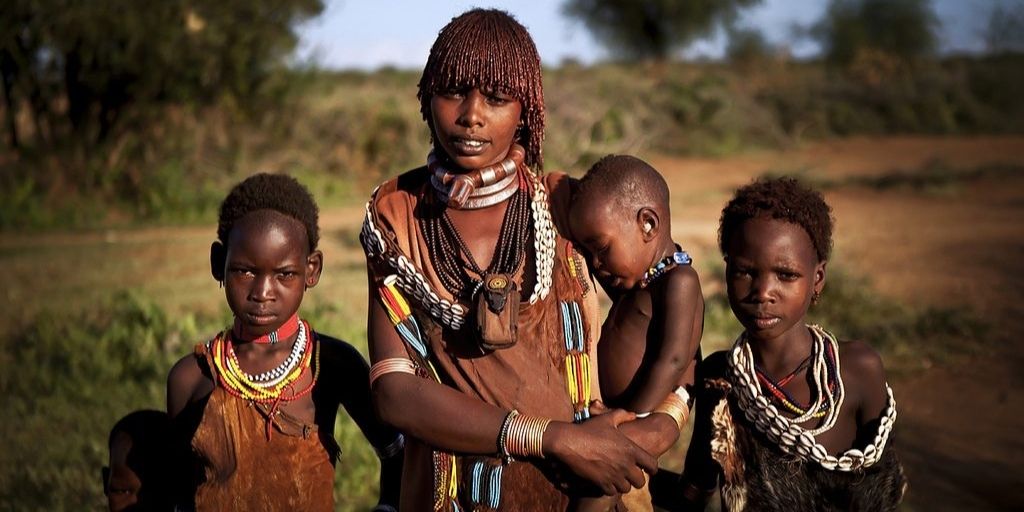African Tribes, African Cultural, Traditions, and Tours
African Tribes, Culture & Traditions (and our top pick of Cultural Tours in Africa). Find out more about the most fascinating African tribes and traditional African cultures in this post, along with recommended cultural tours in Africa.

African Tribes
African culture is incredibly diverse, with fascinating tribes and customs. (Mainly due to Africa being such a vast continent). In this article, you can learn more about the most intriguing African tribes and traditional African cultures, as well as about the best cultural tours in Africa.
It is the only continent that covers both the northern and southern hemispheres, making it the second-largest continent in the planet. The size of Africa is roughly 11.7 million miles (or 30.37 million km2)! Accordingly, the UK is only 0.8 percent the size of the US, which is 32.4 percent the size of Africa.
Over 50 separate nations make up the continent of Africa, which is home to 16% of the world’s population. More than 1.2 billion persons are implied by that. While it is simple to generalize and refer to “African people,” the truth is that there are more than 3000 distinct African tribes spread across these 54 distinct nations!
The constitution of South Africa, which recognizes all 11 official languages as legal tongues, maybe the best example of how diverse that country is.
To highlight Africa’s interesting tribal traditions and its vibrant cultures, I’ve chosen six of my favorite African tribes.
6 African Tribes with Traditional African Cultures
The Maasai of Kenya and Tanzania
Savannahs, lions, safari cars, and a graceful, slim Maasai man in red garb against an endless horizon…
The Great Plains and savannahs of Africa are represented by the red-clad Maasai of Kenya and Tanzania. They are legendary warriors and pastoralists who inhabited East Africa’s wilderness for centuries. The first Maasai, Maasinta, was given cattle by Ngai, the sky god, who brought them down to earth on a leather thong. Since then, cattle have been revered and are valued only second to their offspring. In fact, a large herd and a large family are the hallmarks of a truly prosperous Maasai.
The savannah territory that now comprises the well-known national parks of Ngorongoro, Amboseli, Serengeti, the Masai Mara, and Tsavo was formerly the Maasai people’s home range.
The Maasai have strived to maintain their way of life in spite of the constraints of the modern world, and as a result, any east African safari is filled with colorful Maasai, herding their cattle, strolling down highways, or dancing the adumu.
MAASAI TRIBE: Origin and Culture [Kenya and Tanzania]
Some of the most well-known Maasai customs include the jumping dance, wearing vibrant shuka, spitting, and drinking blood. The jumping dance known as the Adamu is done as part of the initiation ceremony just before young males become men. Male partners compete in pairs to see who can leap the highest while music plays in the background. The rite is carried out as part of the celebration when the lads become eligible bachelors to display prowess and fitness. The best bride is attracted to the jumper.
Shuka is the name of the colorful garment worn by the Maasai. Red, which is regarded as a sacred color and symbolizes blood, serves as the foundation color for all shuka. Along with these advantages, it safeguards the Maasai from wild animals. Blue represents the sky, which brings the rainfall for the cattle, while orange stands for warmth, camaraderie, and hospitality. Yellow is for fertility and growth, while green is for sustenance and production. The Maasai are particularly noticeable in East Africa thanks to their colorful African attire worn collectively.
Yes, the Maasai are hematophagous, which means that they consume blood as food. It is strange because, despite drinking cow’s blood, which is frequently combined with milk, they do not eat wild animals and only occasionally eat beef. Because the Maasai value their livestock, the act of shedding blood doesn’t affect the Maasai’s companion animals in the long run.
Meet the Maasai Tribes of East Africa in Kenya and Tanzania…
- Tanzania Northern Circuit & Serengeti Lodge Safari
- Masai Mara & Serengeti Exclusive Overland Safari
- Masai Mara & Serengeti Family Camping Safari
- Kenya & Tanzania Camping Safari
The Samburu of Northern Kenya
The pastoralist Samburu tribe lives in the vast plains of the Samburu region in north-central Kenya. They are believed to have migrated south from the Nile region of North Africa and are closely connected to the Maasai people of Kenya.
In common with the Maasai, the Samburu people speak a dialect of the Maa language. The Samburu, however, is said to be even more isolated because the area they live in is dry and barren and hence can support fewer life.
Samburu – Adventure in the North of Kenya
The Samburu are pastoralists who mostly maintain cattle but also keep other animals including goats, lambs, and even camels. This African tribe has a nomadic history due to the dry terrain they live in.
Much of the violence in their ever-shrinking range is brought on by their constant search for new pastures for their cattle. Like the Maasai, the Samburu diet consists primarily of milk and animal blood, and eating is only done on exceptional occasions.
The Samburu are well known for their distinctive social structure and colorful clothes. The males dress in bracelets, anklets, and necklaces while donning pink or black clothing that resembles a Scottish kilt.
Long braids are common among the warrior age group or Moran. On the other hand, the women keep their heads shaven and dress in two garments—one around the waist and the other around the chest. The ladies frequently wear blue or purple clothing, and they further beautify themselves by painting their bodies with ochre in a style resembling the Himba of Namibia.
However, the gerontocracy of the Samburu is what makes them unique. A societal system known as a gerontocracy is one in which only the elderly, who make all the choices, are in charge. The leaders are the oldest people in the group, and they have the last say in all decisions as well as the authority to curse less experienced tribal members. The Samburu, a very devout African tribe, derive all of their strength from their god Nakai. The elders, who are in charge of maintaining law and order, are pious and heed his instructions in everything.
Visits to the Samburu are distinctive and fascinating since they are one of the few African tribes that continue to practice their ancient traditions and rituals.
Visit the Samburu in this isolated tribe in northern Kenya to learn about their traditions.
- Lake Turkana & Northern Kenya Camping Safari
- Masai Mara, Samburu, Nakuru 4×4 Kenya Lodge Safari
- Lake Turkana, Chalbi Desert & Samburu Camping Safari
- Masai Mara & Northern Kenya Game Parks 4×4 Safari
Hadzabe Tribe (Hadzabe People of Tanzania)
Throughout history the Maasais have had a reputation for being fearless warriors and have inhabited large territories of Tanzania. They are very proud people and they managed to sustain their own unique culture and language.
The Maasai’s appearance is easily recognized. The men are wearing bring red carpets and traditional sandals, and the women often wear blue kangas, keep their hair short and wear a lot beautiful jewelry.
RAIDING A BABOON CAMP with Hadza Hunter-Gatherers in Tanzania
Their cattle is almost sacred to them. They are sign of wealth and are used as payment. This is why it is only slaughtered at very special occasions and usually the Massais only get to enjoy the milk and blood from the animals. It’s very interesting to visit a Maasai house – or Boma as it’s called – and the Maasais are very hospitable. You might even get to see them sing and dance their traditional Maasai dance. If you are adventurous. It is possible to spend the night in a Massai Boma in the midst of the African wilderness.


